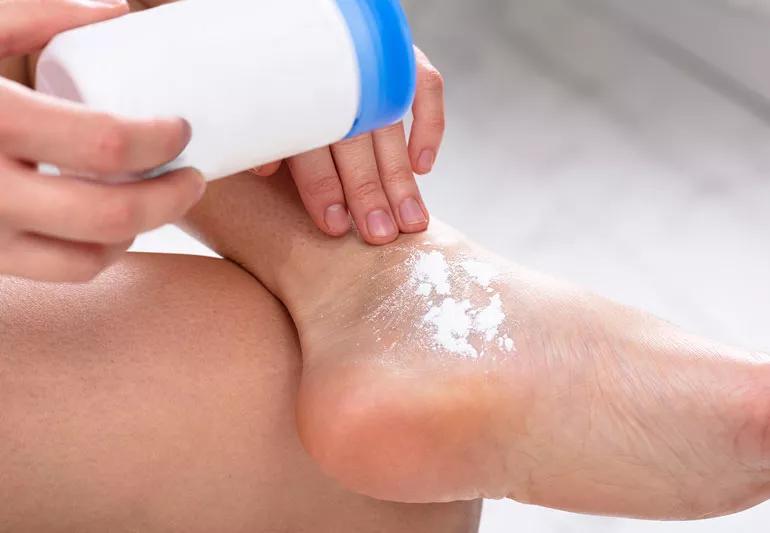Sweat plus bacteria equals sour-smelling feet

Image content: This image is available to view online.
View image online (https://assets.clevelandclinic.org/transform/f59d5382-e392-4257-81fb-f1025ce936fc/foot-powder-on-feet-1141353757-770x533-1_jpg)
Applying foot powder to clean feet to cut down on odor.
Vinegar is pretty cool. You can use it to clean your home, flavor your food and kill weeds. It even repels insects!
Advertisement
Cleveland Clinic is a non-profit academic medical center. Advertising on our site helps support our mission. We do not endorse non-Cleveland Clinic products or services. Policy
Speaking of repellant … have you ever noticed a vinegar smell emanating from your feet? That’s the thing about the smell of vinegar: It’s very context-dependent. The smell of vinegar is great on a potato chip — not so much on your body.
The good news: Sour-smelling feet are a funky problem with several effective DIY solutions. “Feet smell like vinegar when they sweat too much, and the moisture interacts with bacteria on your skin,” explains podiatrist Joy Rowland, DPM.
“The bacteria actually eat your sweat, and this creates an acidic byproduct that smells like vinegar.”
Together, your feet have about 250,000 sweat glands that help regulate body temperature. It’s no wonder your soles tend to get soggy!
“The more your feet sweat, the stronger the vinegar odor will be. So, it’s important to control excessive sweat,” says Dr. Rowland.
The sweat glands in your feet may go into overdrive if you:
Advertisement
Dr. Rowland recommends these seven at-home remedies to help keep your feet smelling fresh:
Start by washing your feet every day before putting on socks or shoes. “Make sure you dry them really well, especially in between your toes,” advises Dr. Rowland. “The toes and arch of your foot tend to build up sweat.”
Kick your foot hygiene up a notch with an over-the-counter medicated foot powder. Apply it to freshly washed and dried feet. “Foot powder helps absorb extra moisture on your skin before you put on your socks and shoes,” states Dr. Rowland. “By absorbing your sweat, it prevents the interaction between bacteria and excessive moisture.”
Moisture-wicking socks are sweat-fighting superheroes. That’s because they’re designed to pull moisture away from your feet and dry quickly. “Socks made from natural fibers like wool can be effective, too. But be careful with cotton,” Dr. Rowland cautions. “Cotton can trap moisture, so you should choose cotton socks that specifically say they wick moisture.”
She continues: “Moisture-wicking socks made from synthetic materials are great, too. But avoid nylon because it can trap sweat and cause sour-smelling feet.”
If you still end up with wet socks (and feet) despite your best sweat-snuffing efforts, don’t despair. Dr. Rowland says an ounce of preparation may just cure your stinky feet. “Carry an extra pair of socks with you. When your first pair starts to get moist, change into the dry ones,” she recommends. “And if certain shoes cause your feet to sweat more, don’t wear them or have another pair on hand to change into.”
Shoes made from breathable natural fibers like leather, canvas and suede are a great option for staving off sweaty feet.
“Avoid shoes that contain a lot of plastic or rubber,” Dr. Rowland adds. “They tend to cause foot moisture because they trap sweat inside the shoe.”
Antiperspirants aren’t just for armpits. Apply them to your feet to keep them dry and smelling fresh. Dr. Rowland says that this practice can be especially helpful for people who wear nylon stockings or compression stockings because they tend to trap moisture.
“After you wash and dry your feet well, spray or apply a light coating of antiperspirant on the soles of your feet. Let them dry and then apply foot powder to the toe area before putting on your stockings, socks or shoes,” explains Dr. Rowland. “That way, you’re covering all the sweat-producing areas of your feet that could interact with bacteria.”
White vinegar kills bacteria (ironically enough). So, if your feet still smell sour, Dr. Rowland recommends soaking them in a mixture of warm water and white vinegar for 10 to 20 minutes. She suggests mixing 1 to 2 cups of white vinegar with a gallon of warm water.
If you have a favorite pair of shoes that you wear often, try spraying their insides and insoles with an over-the-counter disinfectant spray.
Advertisement
“Spray them lightly and let them sit for about 24 hours before you wear them. That will help reduce the bacterial load inside the shoe,” Dr. Rowland notes. “It can also prevent fungal infections. Everyone has bacteria and fungus on their skin. But it’s our job to keep it in check so it doesn’t overgrow.”
For most people, the right foot self-care methods should do the trick. But if you’re not happy with your results, Dr. Rowland says it might be time to visit a podiatrist. “Podiatrists can recommend prescription products that reduce the sweat and bacteria. They can also determine if the vinegar foot odor is the result of something else, so you can address it with the right treatment.”
Advertisement

Sign up for our Health Essentials emails for expert guidance on nutrition, fitness, sleep, skin care and more.
Learn more about our editorial process.
Advertisement
A few precautions can keep your toenails from turning black and falling off
If they don’t fit well in the store, they won’t fit any better at home
The lack of arch support in the popular footwear can lead to numerous aches and pains
Keep your tootsies soft and smooth all summer long
How to slough off that dead skin for softer, smoother feet
Keep stepping through summer with this good-for-your-feet footwear guide
Give your nails a chance to breathe, stay healthy
Make sure your salon is clean and sterilizes its instruments
Type 2 diabetes isn’t inevitable with these dietary changes
Applying a hot or cold compress can help with pain
Pump up your iron intake with foods like tuna, tofu and turkey